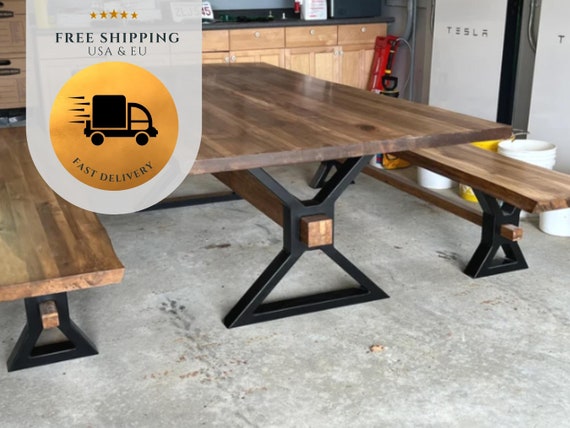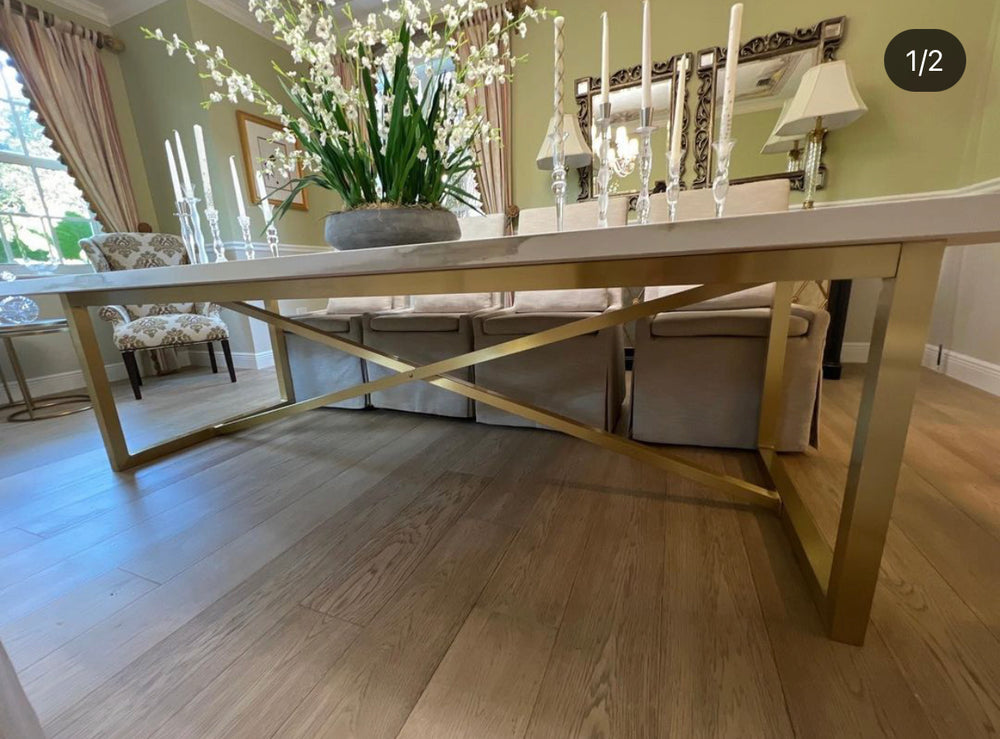Exactly How to Choose the Perfect Dining-room Table Legs for Your Home Decoration
Choosing the ideal eating space table legs is a nuanced process that requires careful consideration of numerous components, including your area restrictions, visual choices, and useful demands. The interaction between materials, measurements, and designs can substantially influence the ambiance of your dining area, making it necessary to approach this decision methodically. As you consider the myriad alternatives offered, it comes to be clear that the appropriate option prolongs beyond simple look; it can boost your overall dining experience. What variables should you prioritize to guarantee your option complements your home's distinct personality?
Assess Your Eating Area
Evaluating your eating space is vital for picking the right table legs that match both visual appeals and capability. Begin by measuring the dimensions of your eating area, consisting of ceiling height, floor space, and closeness to various other furniture. This info will aid establish the ideal dimension and height of your table, which straight affects the option of table legs.
Next, take into consideration the design and layout of your dining area. For instance, an open-concept design might take advantage of table legs that use visual agility, such as slim metal or acrylic options. On the other hand, an extra traditional setup may ask for strong wood legs that give a sense of permanence.
Review the existing color scheme and products in your dining area. Integrating the table legs with these elements creates a cohesive look that boosts the overall style.
Eventually, an extensive evaluation of your dining area will lead you in making an educated decision, guaranteeing that your table legs not only boost the visual charm however likewise offer functional purposes.
Consider Your Design Preferences
When picking dining-room table legs, it is necessary to mirror on your individual design preferences, as they considerably influence the general visual of your dining area. Your option of table legs can either complement or contrast with existing design, making it essential to align them with your favored interior decoration style.
If your home leans in the direction of a contemporary aesthetic, think about streamlined metal or minimalist wood legs that give a tidy, minimalist look. For an extra standard strategy, ornate wood legs with intricate makings can add a touch of style and class. Industrial designs take advantage of durable, basic materials such as redeemed wood and steel combinations, reflecting a rugged beauty.
In addition, farmhouse and rustic styles typically prefer sturdy, beefy legs that evoke a feeling of heat and comfort. Alternatively, if your design is diverse, you might select unusual forms or a mix of materials to produce aesthetic interest.

Evaluate Material Options
The selection of product for eating room table legs plays a pivotal function in both durability and aesthetic appeal. Usual products include timber, metal, and composite options, each offering distinct characteristics that can affect the general look and long life of your table.
Wood is a timeless selection, known for its heat and flexibility. Hardwoods like oak and walnut provide extraordinary strength and can be completed in various stains to match any kind of decoration. However, softwoods like want are more vulnerable to damages and scratches, making them less ideal for high-traffic areas.
Steel legs, usually crafted from steel or aluminum, exhibit modernity and commercial appeal. They are very sturdy and resistant to wear, making them suitable for family members with kids or frequent gatherings (dining room table legs). Furthermore, steel can be finished in numerous colors, boosting the personalization possibilities
Composite materials, such as MDF or laminate, offer price and varied layouts. While normally less sturdy than solid wood or metal, they can still provide a stylish look and are typically simple to keep.
Ultimately, the material you select must straighten with your way of life, aesthetic preferences, and the level of use your table will experience.
Determine Elevation and Size
Picking the proper elevation and size for your dining-room table is vital for both performance and convenience. The common elevation for eating tables usually varies from 28 to 30 inches, permitting sufficient legroom for a lot of people when seated. Nevertheless, it is important to consider the dimensions of your eating space and the kinds of chairs you prepare to make use of.

Furthermore, consider the proportions of your eating space. A bigger table in a roomy area can develop a grand setting, while a smaller sized table find this works well in more intimate settings. Inevitably, the best elevation and size will certainly balance with your total decor and improve the dining experience for you and your visitors.
Explore Customization Opportunities

Additionally, the design of the legs can be tailored to fit numerous designs, such as rustic, modern-day, or industrial. As an example, conical legs can evoke a mid-century modern-day feel, while beefy, block-style legs may resonate with conventional or farmhouse decoration.
Property owners can also discover color coatings, from natural wood stains to paint, enabling them to match or comparison with the tabletop and bordering design.
Moreover, leg height can be changed to suit specific seating plans or individual preferences, improving both convenience and functionality.
Lastly, one-of-a-kind decorations, such as makings or decorative brackets, can further customize the table legs, making the dining experience not simply a declaration but a dish piece in the home. By thinking about these customization options, house owners can produce an find out here now eating space table that genuinely mirrors their uniqueness.
Conclusion
Choosing the perfect dining-room table legs requires mindful consideration of various aspects, including the measurements of the eating area, style choices, product longevity, and preferred elevation. Personalization options even more boost the capacity to attain a natural visual that complements the general decoration. By methodically assessing these components, home owners can make sure that the selected table legs not just meet functional demands but likewise add positively to the eating experience and ambiance of the home.
Selecting the perfect eating space table legs is a nuanced process that calls for cautious consideration of different elements, including your room restraints, visual preferences, and useful needs.Analyzing your see this website dining space is essential for picking the right table legs that complement both aesthetics and functionality.When establishing size, gauge the area where the table will be put to guarantee it fits pleasantly, permitting for at the very least 36 inches of clearance around the table for very easy motion. A bigger table in a roomy location can produce a grand ambiance, while a smaller table works well in more intimate setups.Choosing the ideal eating room table legs requires mindful consideration of numerous aspects, including the dimensions of the eating area, design choices, material sturdiness, and preferred elevation.
Comments on “The Impact of Dining Room Table Legs on Your Table's Overall Design”